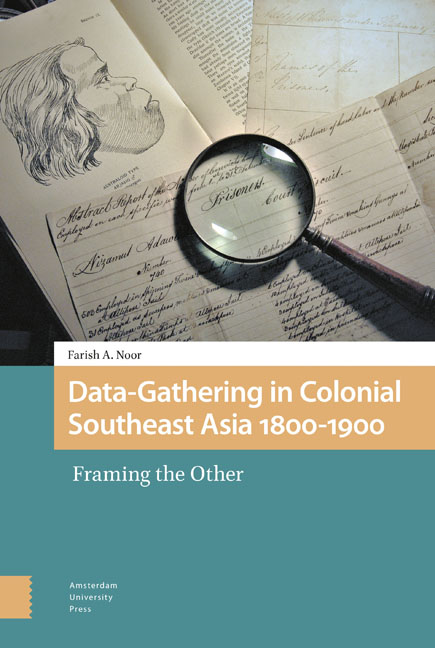Book contents
- Frontmatter
- Dedication
- Contents
- A Note on Spelling
- Introduction: The Panopticon in the Indies: Data-Gathering and the Power of Knowing
- 1 Caught in the Eye of Empire: Stamford Raffles’ 1814 Java Regulations
- 2 Deadly Testimonies: John Crawfurd’s Embassy to the Court of Ava and the Framing of the Burman
- 3 Fairy Tales and Nightmares: Identifying the ‘Good’ Asians and the ‘Bad’ Asians in the Writings of Low St. John
- 4 The Needle of Empire: The Mapping of the Malay in the works of Daly and Clifford
- 5 The Panopticon in the Indies: Data-collecting and the Building of the Colonial State in Southeast Asia
- Appendix A Proclamation of Lord Minto, Governor-General of British India, at Molenvliet, Java, 11 September 1811
- Appendix B Proclamation of Stamford Raffles, Lieutenant-General of Java, At Batavia, Java, 15 October 1813
- Appendix C The Treaty of Peace Concluded at Yandabo
- Appendix D The Treaty of Friendship and Commerce between Her Majesty and the Sultan of Borneo (Brunei). Signed, in the English and Malay Languages, 27 May 1847
- Appendix E The Racial Census employed in British Malaya from 1871 to 1931
- Timeline of Events and Developments in Southeast Asia 1800-1900
- Bibliography
- Index
5 - The Panopticon in the Indies: Data-collecting and the Building of the Colonial State in Southeast Asia
Published online by Cambridge University Press: 21 November 2020
- Frontmatter
- Dedication
- Contents
- A Note on Spelling
- Introduction: The Panopticon in the Indies: Data-Gathering and the Power of Knowing
- 1 Caught in the Eye of Empire: Stamford Raffles’ 1814 Java Regulations
- 2 Deadly Testimonies: John Crawfurd’s Embassy to the Court of Ava and the Framing of the Burman
- 3 Fairy Tales and Nightmares: Identifying the ‘Good’ Asians and the ‘Bad’ Asians in the Writings of Low St. John
- 4 The Needle of Empire: The Mapping of the Malay in the works of Daly and Clifford
- 5 The Panopticon in the Indies: Data-collecting and the Building of the Colonial State in Southeast Asia
- Appendix A Proclamation of Lord Minto, Governor-General of British India, at Molenvliet, Java, 11 September 1811
- Appendix B Proclamation of Stamford Raffles, Lieutenant-General of Java, At Batavia, Java, 15 October 1813
- Appendix C The Treaty of Peace Concluded at Yandabo
- Appendix D The Treaty of Friendship and Commerce between Her Majesty and the Sultan of Borneo (Brunei). Signed, in the English and Malay Languages, 27 May 1847
- Appendix E The Racial Census employed in British Malaya from 1871 to 1931
- Timeline of Events and Developments in Southeast Asia 1800-1900
- Bibliography
- Index
Summary
The question of the state is a question of knowledge, especially scientific knowledge; and the classing of knowledge must be underwritten and directed by the state in its various capacities; that all epistemology became and must remain state epistemology in an economy of controlled information.
Thomas Richards,The Imperial Archive (1993)We want to know you better: Data-collecting in the service of Empire
From the late-19th to the mid-20th centuries, the European colonial powers continued to build their respective colonies in Southeast Asia for the sake of expanding the power of their respective countries and to address the growing demands of their own populations back home. Governor Sir Andrew Clarke's claim that the Malay Peninsula was the perfect place to send Britain's failures – a kind of second home for dullards – was in some ways correct, for it doesn't require that much intelligence to run the machinery of Empire – though building an Empire does. Empire-building was not solely related to questions of prestige and standing in the Western world, for as Pankaj Mishra (2017) – via Arendt – has argued, ‘this debasing hierarchy of races was established (overseas) because the promise of equality and liberty at home (in Europe) required imperial expansion abroad in order to be even partially fulfilled. We tend to forget that imperialism, with its promise of land, food and raw materials, was widely seen in the late 19th century as crucial to national progress and prosperity. Racism was – and is – more than an ugly prejudice. It involved real attempts to solve, through exclusion and degradation, the problems of establishing political order, and pacifying the disaffected, in societies roiled by rapid social and economic change’. In the face of rapid socio-political change and growing public unease both at home and in the colonies, the need to know more about colonial society in order to manage and police it better was paramount.
The building of the all-seeing and all-knowing colonial apparatus has been the subject of this book, and in the previous chapters I have looked at the writings of colonial functionaries like Raffles, Crawfurd, St. John, Low, Daly, Clifford, as well as their supervisors and subordinates, who were the architects of this system of data-gathering, mapping and framing of the colonised Other. Their efforts did require intelligence, and the outcome was more (economic, political, strategic and military) intelligence that served the ends of empire-building.
- Type
- Chapter
- Information
- Data-Gathering in Colonial Southeast Asia 1800–1900Framing the Other, pp. 189 - 224Publisher: Amsterdam University PressPrint publication year: 2019



